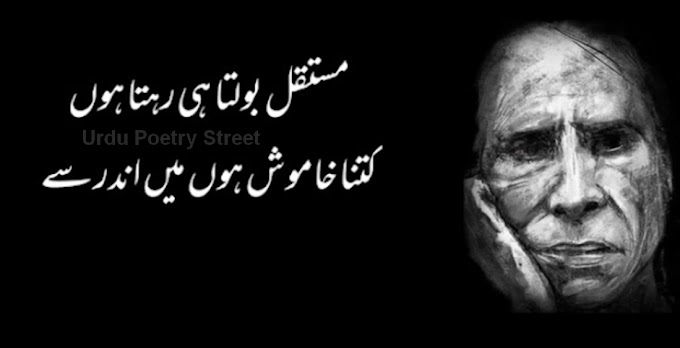Tere Badly Huey Lehjy Se Kehein Behtar Hai
Hum Judai Ki Azeeyat He Gawara Kar Lein
Kuchh Khuda Aeisi Kary Tujh Ko Mohabbat Ho Jaey
Tu Pukary Humein Hum Tujh Se Kinara Kar Lain
تیرے بدلے ہئے لہجے سے کہیں بہتر ہے
ہم جدائی کی اذیت ہی گوارا کر لیں
کچھ خدا ایسے کرے تجھ کو محبت ہو جائے
تُو پکارے ہمیں ہم تجھ سے کنارا کر لیں
This couplet reflects a profound sentiment of heartbreak and longing, intertwined with a glimmer of hope and a plea for divine intervention. Let's break down each part
1. "Tere Badly Huey Lehjy Se Kehein Behtar Hai" - "It is better to speak in a tone other than yours."
In this line, the speaker suggests that it would be preferable to communicate or express oneself using a different tone or manner ("Lehjy") than that of the beloved. This implies a sense of discomfort or pain associated with the beloved's demeanor or communication style, suggesting that it would be less painful to communicate differently.
2. "Hum Judai Ki Azeeyat He Gawara Kar Lein" - "Let us endure the agony of separation."
Here, the speaker resigns themselves to accepting and enduring the pain ("Azeeyat") of separation ("Judai"). Despite the suffering it entails, the speaker seems to suggest that they have no choice but to bear the pain of being apart from their beloved.
3. "Kuchh Khuda Aeisi Kary Tujh Ko Mohabbat Ho Jaey" - "May God do something so that you fall in love."
In this line, the speaker expresses a hope or wish that God intervenes in the situation to make the beloved ("Tujh Ko") fall in love. This suggests a desire for reconciliation or for the beloved to reciprocate the speaker's feelings, implying that divine intervention may be the only solution to their predicament.
4. "Tu Pukary Humein Hum Tujh Se Kinara Kar Lein" - "You call us, and we will distance ourselves from you."
In this concluding line, the speaker offers a resolution to the situation, suggesting that if the beloved calls upon them ("Tu Pukary"), they will distance themselves ("Hum Tujh Se Kinara Kar Lein"). This implies a willingness to step back or let go of the relationship if the beloved no longer wishes to be with them.
Overall, this couplet captures the complex emotions of heartbreak, longing, and resignation, while also hinting at a glimmer of hope and a plea for divine intervention. It reflects the pain of unrequited love and the internal struggle to accept and move on from a relationship that may not be reciprocated.










